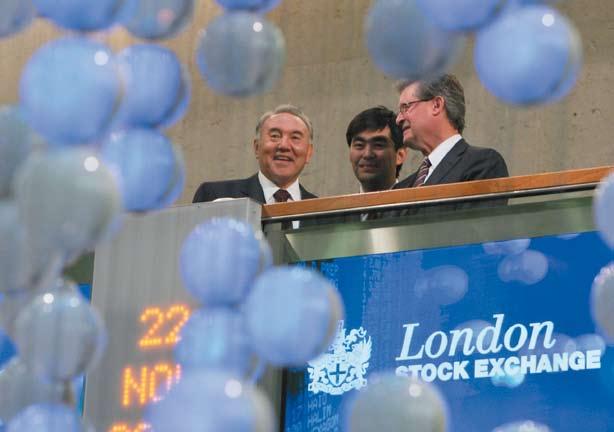Kazakh company on FTSE 100 a risk for investors, says Global Witness

DOWNLOAD GLOBAL WITNESS REPORT HERE
*Supporting document: President Nazarbayev’s hotel bill from his official visit to the UK in 2006. This was sent to Kazakhmys plc (see Risky Business p.30).
Kazakhmys plc, a FTSE 100 company which mines copper in the Central Asian nation of Kazakhstan, failed to declare potentially key information about its shareholders and directors when it listed on the London Stock Exchange, thereby exposing investors to unquantifiable risk, warns a new Global Witness report.
Risky Business: Kazakhstan, Kazakhmys plc and the London Stock Exchange raises serious concerns about London’s “light-touch” market regulation and argues that it would be in the public interest for companies like Kazakhmys to be required to provide much more information to investors about political risk.
Kazakhstan is an autocracy ruled by President Nursultan Nazarbayev, who enjoys immunity from prosecution despite having allegedly received bribes from foreign oil companies in the 1990s in the so-called Kazakhgate scandal. But investors were not told when Kazakhmys listed that certain senior managers (who own nearly half the company’s shares), have close political ties to Nazarbayev.
“Investors, including ordinary people saving for their pensions, need to know the risks around Kazakhmys because its shares contribute to the FTSE 100 index. But because UK regulation is so inadequate, we know little about how senior managers, who are also its major shareholders, relate to President Nazarbayev,” said Tom Mayne, a campaigner at Global Witness.
Numerous sources, including former members of the Kazakh ruling elite, have told Global Witness that certain managers owe their positions to Nazarbayev. These allegations are unproven but need to be taken seriously because they raise legitimate concerns that Nazarbayev may be able to unduly influence the company’s decisions in ways which are detrimental to shareholders’ interests. There is also a risk that if Nazarbayev loses power, his association with Kazakhmys executives could lead the new government to take actions that hurt the company.
Global Witness’s report shows that Kazakhmys plc’s listing prospectus – the key document which investors rely on when a company lists on the stock exchange – omitted potentially vital information about the biographies of its senior managers. For example, the chairman of Kazakhmys’ main operating subsidiary is Nazarbayev’s former chief-of-staff. Global Witness’ report also reveals discrepancies in the declarations of the company’s shareholding structure.
The Financial Services Authority (FSA), which regulates the London market, refused to tell Global Witness what due diligence it had done on Kazakhmys on the grounds that it was “not in the public interest”. Kazakhmys itself declined to answer individual questions raised by Global Witness but said there had been a “very rigorous and comprehensive” process to prepare for the listing, including “thorough due diligence.”
“In regions where the rule of law is weak, ruling elites may seek favours, payments or even influence over management, to the detriment of shareholders. This is a major risk in Kazakhstan. The FSA must stop prevaricating and investigate our findings.” said Mayne.
Global Witness is calling for wider reforms of stock market listing rules in the UK and other major securities markets, to create more transparency about the activities of oil and mining companies and ensure that investors have the full information they need to assess risk.
Original source : GLOBAL WITNESS